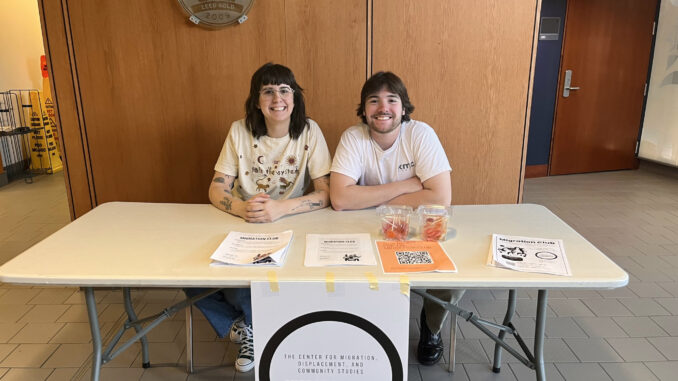
Isabella Abbott | Features Editor
April 13, 2023
Duquesne’s Migration Club is working with the McAnulty College of Liberal Arts to create a food pantry for all Duquesne students, faculty and professors to use if and when needed.
Graduate assistant for the Center for Migration, Gabriela Sanchez, said the project began to fight food insecurity on campus.
“Everyone simultaneously identified the need and the desire for a presence of something to mitigate food insecurity and then also to educate and sustain the community with more present gardening practices,” Sanchez said.
As a club, their goal is to make sure everyone in the Duquesne community has reliable access to a sufficient quantity of nutritious food. Sanchez said it’s important to have these options, especially as a college student.
“To be able to function well in an academic setting, the very base of what you need is a good body and a good mind,” Sanchez said. “Food matters, you are what you eat.”
Jason Minicozzi, the Vice President of the Migration Club, said his goal for the club is to define food insecurity for other students.
“We want to inform people of what food insecurity is,” Minicozzi said. “If you’re eating ramen, you have food on the table, but it’s not nutritious. It’s not a lot of food and because it’s ramen, it means you probably can’t afford more food.
“So, we want to inform people that they might be food insecure and not even know it,” Minicozzi said.
According to a study done in 2018 that researched food insecurity at universities in Southwestern Pennsylvania, approximately 30% of Duquesne students experienced moderate-to-high food insecurity, with another 20% at-risk for food insecurity. In the same study, 70% of students surveyed said they would use a food pantry if that option was available to them.
Some students, like Sanchez, have even heard of other students taking immense measures to be able to afford food.
“I’ve heard of so many stories of graduate students donating blood to get money to be able to get their food,” Sanchez said. “That shouldn’t be the case.”
Sanchez hopes for this to not be an issue in the future.
“What I at least hope happens is one, that there’s a big awareness on campus that it exists and that it is accessible,” Sanchez said. “Two, I want it to not be stigmatized, essentially that there wouldn’t be a high barrier in someone’s mind to visit.”
Other demographics on campus also have an issue with purchasing sustainable food. An example is international students.
“The international students have a student visa, they really can only do a work study so they have to work at Duquesne,” Minicozzi said.
And working at Duquesne may not be enough to provide for themselves while they’re away from home.
The pantry will even allow for students with special dietary needs to get what they need in order to function.
“We also have in the pantry, a way for students to be like, ‘I have these dietary restrictions and the pantry doesn’t offer my preference,’” Minicozzi said. “So then they fill out the survey, and then we will go out and source that food for them.”
Dr. Jennie Schulze, Director of the Center for Migration, Displacement and Community Studies at Duquesne, said she’s proud of all the hard work that the club is doing, but acknowledges that more help is always necessary.
“So the student leadership of the club has just been outstanding,” Schulze said. “But these initiatives are going to need a lot of volunteers and a lot of support in order to be sustainable over the longer term.
“Obviously, the students are really driven by Duquesne’s spirit and mission and I’m really confident that all those initiatives are going to have an impact both on our campus and in our wider community,” Schulze said.
The club has also set up donation boxes around campus for students and staff to donate non-perishable items like cans, rice and jarred pasta sauce. This will help them to stock the pantry when it’s ready to be in use.
In the future, the club is hoping to connect with other pantries in the Pittsburgh area.
“In the longer term, we want to link up with other student pantries in and around Pittsburgh so that there’s a bit of a pantry network, if you will, so that we can have more community outreach,” Sanchez said.
Interested students can reach out to either Dr. Schulze or check out the club’s Instagram @duqmigrationclub.
